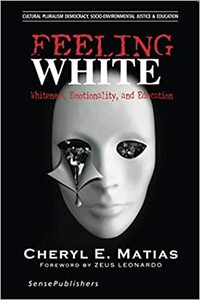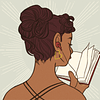Take a photo of a barcode or cover
Matias is a baller, and her ideas are more compelling than Robin DiAngelo's (I will give you one guess why people go to DiAngelo instead), but man oh man is she the absolute fucking worst at similes and metaphors. I have edited more bad writing than I can remember because that's being a book editor, and it's wild because the gusto with which Matias goes after her absolutely horribly ill-advised and poorly conceptualized similes and metaphors is something I usually only see in fiction writers!
But in all seriousness, there is some really good stuff in here about critical whiteness, and there's some sappy shit about social justice that kind of made me want to vomit, and as an editor I can't get fully behind her as a writer because she's just not that gifted at it and really thinks she has something, but as a scholar with ideas, she is absolutely at the top of the game and deserves much wider recognition in the academy AND in the general public.
But in all seriousness, there is some really good stuff in here about critical whiteness, and there's some sappy shit about social justice that kind of made me want to vomit, and as an editor I can't get fully behind her as a writer because she's just not that gifted at it and really thinks she has something, but as a scholar with ideas, she is absolutely at the top of the game and deserves much wider recognition in the academy AND in the general public.
Matias writes, "This book is a project to reaffirm our humanity by recognizing the racialized states of our emotionalities, its association with the permanence of whiteness, and how education can be one avenue that can lead us down a path that liberates our communal heart." Doing so takes work, however, which Matias delineates over the course of the book---exploring how and why "feelings" have a symbiotic relationship with socially constructed norms. These norms, of course, often stem from *whiteness* as the hegemonic, driving force behind it all. Thus, we see from Matias' work precisely why it is (drawing from Noel Ignatiev) that a "betrayal to whiteness is loyalty to humanity." Selah.
I think this book is very important, but was a mixed bag for me personally. Some of the analysis was extremely powerful and valuable to challenge me as a White person to consider more deeply my complicity in Whiteness and colonization. Some of the connections, however, did not work for me. In particular, some of the author's personal narratives about motherhood fell flat for me as a nonbinary trans person. Perhaps it was my own discomfort at personal sharing in scholarly work (or the tone that was used to do so) that threw me off. I've been wrestling with whether or not my Whiteness is causing me to be overly critical of some of these moments. I'm still unsure.
One thing I would have liked more of was deep engagement with the literature and theorizing about Whiteness. Some of the chapters felt repetitive and much of the literature in each chapter was used in subsequent chapters. While it's certainly not a bad idea to reinforce concepts, having essentially the same point and the same quote from a text used repeatedly felt unhelpful and could have had a greater impact if there was a greater variety of literature used and argument made. Sometimes I felt like just as some deep engagement was established and a source (like Fanon's Black Skin, White Masks or Memmi's The Colonizer and the Colonized), a chapter ended and a new topic was introduced. Perhaps this book's intended audience is someone for whom these concepts are new, but I was hoping for a deeper dive into this theorization.
I'm excited to see what comes next as more complex theorization and analysis of Whiteness develops from/alongside this work.
One thing I would have liked more of was deep engagement with the literature and theorizing about Whiteness. Some of the chapters felt repetitive and much of the literature in each chapter was used in subsequent chapters. While it's certainly not a bad idea to reinforce concepts, having essentially the same point and the same quote from a text used repeatedly felt unhelpful and could have had a greater impact if there was a greater variety of literature used and argument made. Sometimes I felt like just as some deep engagement was established and a source (like Fanon's Black Skin, White Masks or Memmi's The Colonizer and the Colonized), a chapter ended and a new topic was introduced. Perhaps this book's intended audience is someone for whom these concepts are new, but I was hoping for a deeper dive into this theorization.
I'm excited to see what comes next as more complex theorization and analysis of Whiteness develops from/alongside this work.
challenging
informative
reflective
medium-paced
informative
reflective
medium-paced
Read through Chapter 6 & needed to return it to the library (only 1 copy & holds on it). Want to check it out again & finish it.
I've spent a lot of time wondering about how we can best integrate therapeutic understandings of emotion with critical race theory. Dr. Matias does that here in a way that is masterful and actively challenges the status quo—pushing her students to engage in difficult ways in the classroom, because trust and connection require discomfort. About 5 pages into reading the introduction in my library copy, I immediately went and bought another copy online for myself, because I knew it was one I'd revisit again. 5/5 stars for sure.




